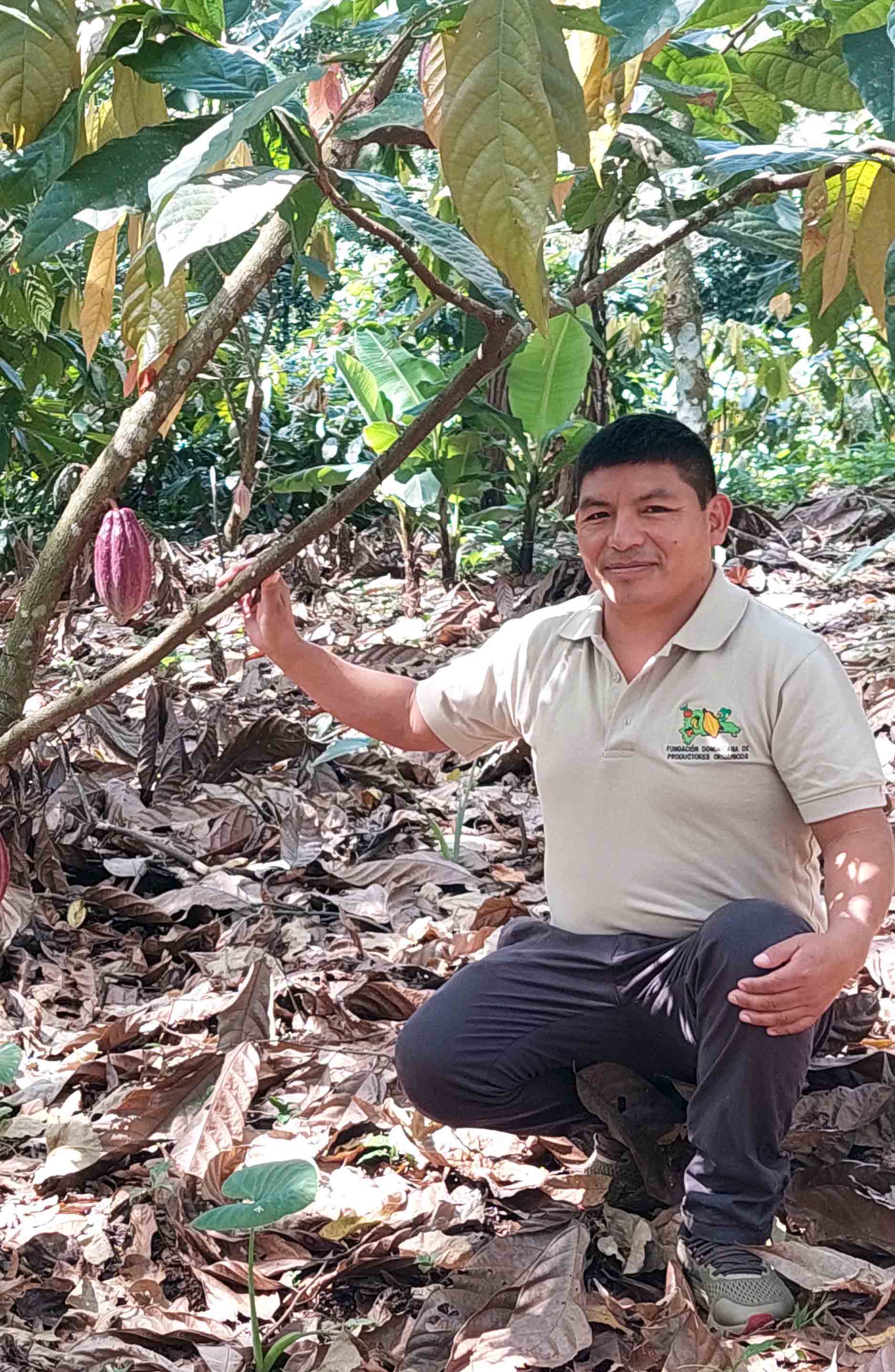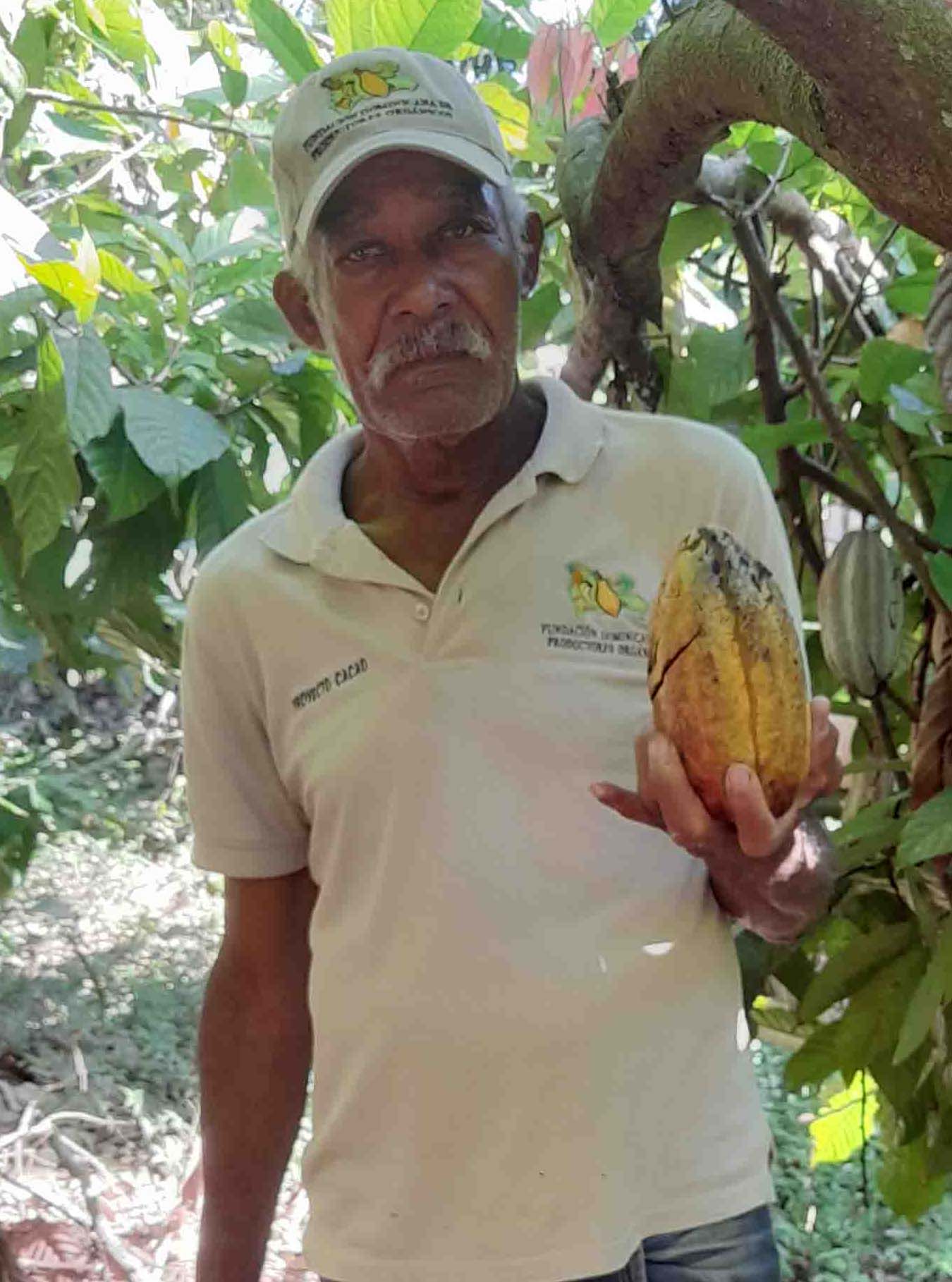FUNDOPO – Cocoa Dominican Republic
Today's Fundación Dominicana de Productores Orgánicos (FUNDOPO) started with a group of smallholder families in 2000 and became Fairtrade certified in 2005. The history of FUNDOPO has been closely linked to PRONATEC. Our subsidiary YACAO in the Dominican Republic was instrumental in the founding of FUNDOPO. To this day, we are a loyal partner to the more than 3,000 FUNDOPO smallholders and buy their entire harvest.
![]()
FUNDOPO at a glance
- 2000 launch of small farmers’ movement
- Fairtrade-certified since 2005
- 3,024 members (of whom 506 are women)
- 17’705 hectares in cultivation
Partnerprofile FUNDOPO
![]()
FUNDOPO began with 84 farming families and is now one of the most successful smallholder organisations in the Dominican Republic. In the past, the smallholder families were barely able to survive on sales of their conventional cocoa beans. Today, they get a fair price for their organic produce.
Fair trade cocoa beans benefit the whole region
Because they can see the prospect of earning an attractive income, many people remain living in their local rural area and invest in their cocoa and other crop smallholdings instead of moving to the cities. With their Fairtrade premiums, they fund community projects that help the whole region. This benefits not only the smallholders and their families but also seasonal workers and numerous schoolchildren, e.g. thanks to the distribution of school kits, shoes, laptops, sports material and toys.
Fairtrade premiums improve living and working conditions
Most smallholders in the Medina, Yamasá, Puerto Plata and El Seibo regions do not live close to their cocoa fields. The villages are spread out along the road, while the cocoa fields are located in the hilly hinterland. Even today, most of the beans are still transported to the central collection point on foot or by mule. Using the Fairtrade premiums to maintain the roads is therefore a huge benefit. Since 2020, some 2000 smallholder families as well as 4700 members of the communities no longer have to carry their water laboriously over great distances: eight new water supply points have brought running water to the villages.
Fairtrade projects 2022
- Improving quality – warehouses, collection points, education centres
- Supporting members in need – construction of 6 private houses, renovation work, paying for doctors/medicines for 250 members
- 5 minutes instead of 1 hour – improving the road for delivering the cocoa
Organic cocoa from agroforestry
The FUNDOPO smallholders have often been tending their plots of land for generations. They alternate cacao trees, shade trees and other crops such as citrus fruits, sapote and avocado. That is good for the fertility of the soil, increases resilience to climate change and encourages biodiversity. The cacao trees are neither watered nor fertilised. The soil is left undisturbed, with fallen leaves and plant residues providing valuable humus and fertiliser in a natural cycle.
Show gardens and awareness campaigns encourage more sustainable farming
From 2023, smallholders will be able to visit newly laid out show gardens to learn in a very practical way how they could improve their own plots of land. “If people can see how taking certain steps to look after the plants has a positive effect on quality and yield, they will be more motivated to do it,” says Wilder Nahui, Managing Director. FUNDOPO offers their members financial incentives to encourage tasks such as pruning, weeding and organic pest control.
Biodiversity in cocoa cultivation
The smallholders have the opportunity to obtain mixed bundles of different varieties of cocoa seedling from FUNDOPO's two tree nurseries at cost price. This protects cocoa farming in the Dominican Republic from the pests and diseases that are a threat in monocultures. Training courses on sustainable cocoa cultivation and subjects such as waste/waste water management and integrated pest control are bringing about lasting improvements.

Here’s what FUNDOPO stands for
- Coordinated cocoa harvesting, advice and training
- Show gardens to put learnings into practice
- Cocoa seedlings at cost price from own 2 tree nurseries
- Awareness campaigns about waste/waste water management, biodiversity, integrated pest control
- Democratic management of Fairtrade premiums, in 2022 e.g. (rounded numbers):
- 56.6% production support
- 15.2% community projects/support of members
- 13.4% strengthening of organization
- 7.5% admin
- 5.8% certifications
FUNDOPO: a strong foundation of transparency and trust
Since 2020, a new management team has prioritised transparent management and the establishment of strong relationships based on trust between smallholders and managers. Deliberate attempts are also being made to include the younger generation. Another high priority is the health of the smallholders. Where necessary, members are given financial assistance to see a doctor or obtain medicines, and they are also helped with building a house or carrying out important renovations.
FUNDOPO and YACAO – a symbiosis of enormous benefit to everyone
The history of FUNDOPO has always been closely connected with YACAO – PRONATEC's subsidiary in the Dominican Republic. YACAO buys the entire harvest from the FUNDOPO smallholders at a fair price and handles everything to do with quality control, fermentation, drying and export.
In this interview, the two managing directors Kilian Moser of YACAO and Wilder Nahui of FUNDOPO tell us more about the opportunities and challenges of their current cooperation.
![]()
PORTRAIT OF A SMALLHOLDER
Crucito Suazo - A life shaped by cocoa
Crucito Suazo, 65, was born into a family of small-scale rice farmers in Las Matas de Cotui. At 28, Crucito moved into the Don Juan district of Monte Plata to work as a day labourer in the dairy industry. When he was 39, he bought a plot of land measuring approx. 12,600 m², planted with cassava, and dedicated himself to growing organic cocoa. “I like the cacao tree. It has helped me to feed myself and my family every day,” says Crucito.
The land where Crucito grows cocoa is only about 200 m away from his small house. Crucito works his land with a machete and harvests the cocoa pods by hand with a knife, cutting them open to extract the cocoa beans. He takes the beans to a central point in the region, where they are sold for him.
Crucito heard about the smallholders’ organisation FUNDOPO in 2008 and has remained loyal to it ever since. FUNDOPO helped Crucito to build his house, for which he is very grateful. Crucito has two children, a girl called Rossy Mercedes and a boy called Santiago, and is able to feed them both thanks to cocoa.
![]()

Looking back: when FEDOPO became FUNDOPO
Up until 2007, FUNDOPO was called FEDOPO. The change in legal status and therefore in its name was due to certain requirements under the Dominican Republic’s legislation on cooperatives and organisations. So the union of smallholders that started in 2000 and the subsequent “Federación Dominica de Productores Organicos” (FEDOPO), founded in 2002, became the non-profit foundation “Fundación Dominica de Productores Organicos” (FUNDOPO) in 2007.
Cocoa from the Dominican Republic in our products
The cocoa produced and processed by FUNDOPO and YACAO is available from us as organic fair trade cocoa beans, organic fair trade cocoa mass, organic fair trade cocoa butter and organic fair trade cocoa powder. Some of it goes into our aromatic organic fair trade chocolates and organic fair trade couvertures.


